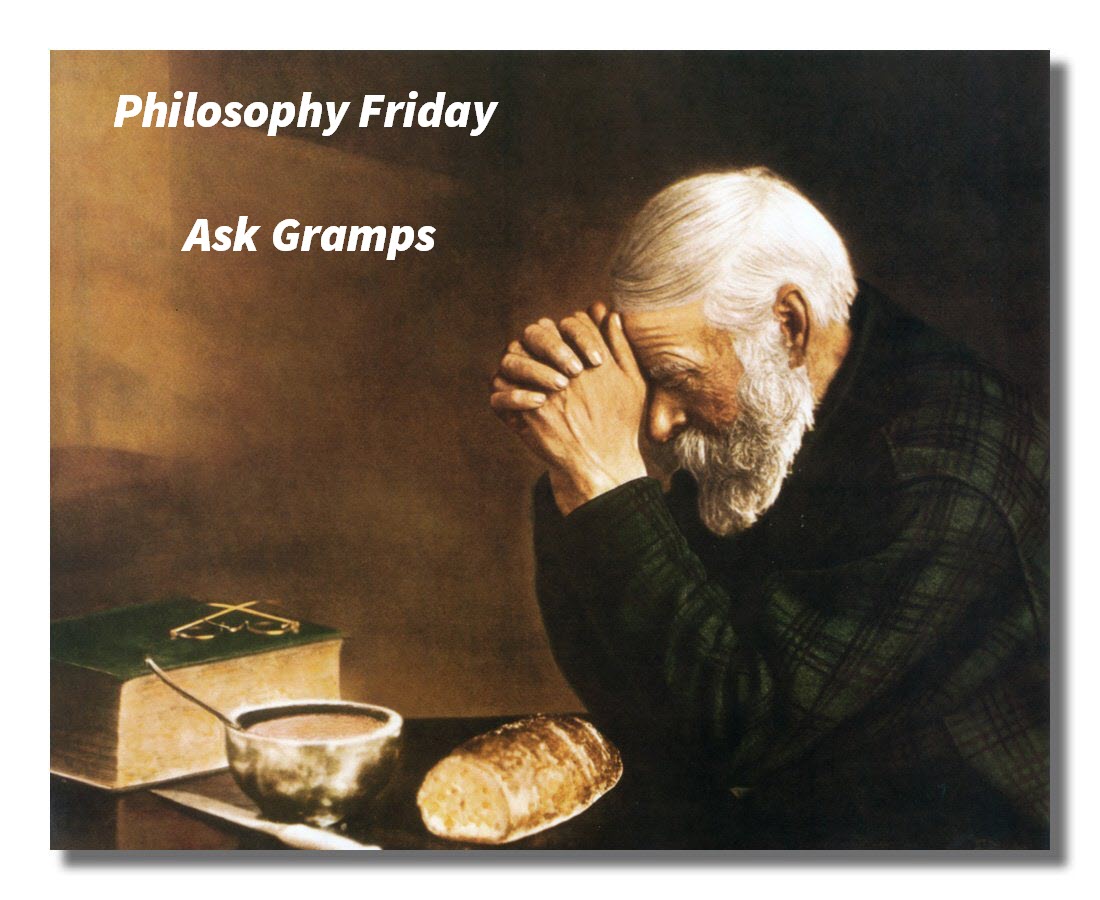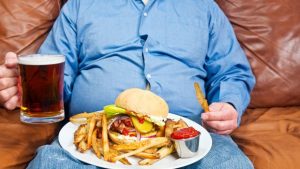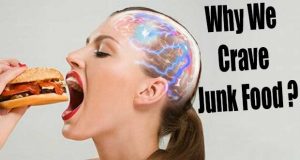
Shownotes
Wisdom-Trek / Creating a Legacy
Welcome to Day 868 of our Wisdom-Trek, and thank you for joining me.
This is Guthrie Chamberlain, Your Guide to Wisdom
Why We Crave Junk Food – Ask Gramps

Thank you for joining us for our five days per week wisdom and legacy building podcast. This is Day 868 of our trek, and it is time for our Philosophy Friday series.
Each Friday we will ponder some of the basic truths and mysteries of life and how they can impact us in creating our living legacy. As we continue on this trek called life, sometimes we have questions about life, so our Friday trek is a time when we can Ask Gramps. Gramps will answer questions that you would like to ask your dad or granddad, but for whatever reason are unable to.
No matter how old we are, I know that all of us would like the opportunity to ask our dad or gramps questions about life in many areas. We will address areas such as finances, relationships, health/fitness, business/work, home repairs/renovations, seasons of life, spiritual/Biblical questions, and any others areas that come our way. As your fellow sojourner and mentor on this trek that we call life, it is Gramps’s goal to provide you with practical wisdom and advice about any area of life. It is crucial that I receive a constant flow of questions, so please submit your questions to guthrie@wisdom-trek.com. And Gramps will answer your questions on our Friday podcast.
We are broadcasting from our studio at The Big House in Marietta, Ohio. While any time of year we can fall prey to eating junk food, we are no less tempted during summer cookouts and family gatherings. Spring and summer give us extra opportunities to get outside and exercise more, and there are many more opportunities to buy healthy locally grown produce. It is a great time to begin new habits of healthy eating and exercise. So our question for today is…
“Hey Gramps, I have a difficult time avoiding junk food. Even though I know I should make better food choices, I so often fall back into the habit of gorging myself with the food that is unhealthy and causes me to gain weight. How can I change?”
Why We Crave Junk Food

This is a somewhat complex question, so I am going to split my response into two parts. This week we will explore why we crave junk food, and next week we will explore how to change your eating habits.
I want to ask you a question before we dive in. Do you really desire to change? No amount of scientific proof or logic will cause you to change unless you accept responsibility for yourself and choose to change your eating habits.
Most of us know that junk food is unhealthy. We know that poor nutrition is related to heart problems, high blood pressure, and a host of other health ailments. You might even know that studies show that eating junk food has been linked to increases in depression.
But if it’s so bad for us, why do we keep doing it?
There is an answer, and it has much more to do than just your willpower. If you understand the scientific reasons why you crave junk food, then you can make a choice to also avoid it.

Much of this information comes from a report titled “Why Humans Like Junk Food” written by Steven Witherly, a food scientist. He explores the scientific reasons why junk food is so desirable to all of us. According to Witherly, when you eat tasty food, there are two factors which make the experience pleasurable.
First, there is the sensation of eating the food. This includes what it tastes like (salty, sweet, spicy, etc.), what it smells like, and how it feels in your mouth. This last quality, known as “orosensation,” can be particularly important. Food companies will invest millions of dollars to discover the most satisfying level of crunch in a potato chip. Their scientists will test for the perfect amount of fizz in a soda. These factors all combine to create the sensation that your brain associates with a particular food or drink.
The second factor is the actual macronutrient makeup of the food — the blend of proteins, fats, and carbohydrates that it contains. In the case of junk food, food manufacturers are looking for a perfect combination of salt, sugar, and fat that excites your brain and gets you coming back for more.
Here’s how they do it…
How Science Creates Cravings
There is a range of factors that scientists and food manufacturers use to make food more addictive.

Dynamic contrast. Dynamic contrast refers to a combination of different sensations in the same food. In the words of Witherly, foods with dynamic contrast have “an edible shell that goes crunch followed by something soft or creamy and full of taste-active compounds. This rule applies to a variety of our favorite food structures. Some examples are the caramelized top of a creme brulee, a slice of pizza, or an Oreo cookie. The brain finds crunching through something like this very novel and thrilling.”
Salivary response. Salivation is part of the experience of eating food, and the more that food causes you to salivate, the more it will swim throughout your mouth and cover your taste buds. For example, emulsified foods like butter, chocolate, salad dressing, ice cream, and mayonnaise promote a salivary response that helps to lather your taste buds with goodness. This is one reason why many people enjoy foods that have sauces or glazes on them. The result is that foods that promote salivation do a happy little tap dance on your brain and taste better than ones that don’t.
Rapid food meltdown and vanishing caloric density. Foods that rapidly vanish or “melt in your mouth” signal to your brain that you’re not eating as much as you actually are. In other words, these foods literally tell your brain that you’re not full, even though you’re eating a lot of calories. Think of foods like Cheetos or other light snack foods that are full of calories, but no nutritional value. The result: you tend to overeat.
Sensory-specific response. Your brain likes variety. When it comes to food, if you experience the same taste over and over again, then you start to get less pleasure from it. In other words, the sensitivity of that specific sensor will decrease over time. This can happen in just minutes.
Junk foods, however, are designed to avoid this sensory-specific response. They provide enough taste to be interesting (your brain doesn’t get tired of eating them), but it’s not so stimulating that your sensory response is dulled. This is why you can swallow an entire bag of potato chips and still be ready to eat another. To your brain, the crunch and sensation of eating Doritos is novel and interesting every time.
Calorie density. Junk foods are designed to convince your brain that it is getting nutrition, but to not fill you up. Receptors in your mouth and stomach tell your brain about the mixture of proteins, fats, carbohydrates in a particular food, and how filling that food is for your body. Junk food provides just enough calories that your brain says, “Yes, this will give you some energy” but not so many calories that you think “That’s enough, I’m full.” The result is that you crave the food, to begin with, but it takes quite some time to feel full from it.
Memories of past eating experiences. When you eat something tasty (say, a bag of potato chips), your brain registers that feeling. The next time you see that food, smell that food, or even read about that food, your brain starts to trigger the memories and responses that came when you ate it. These memories can actually cause physical responses like salivation and create the “mouth-watering” craving that you get when thinking about your favorite foods.
All of this brings us to the most important question of all.
Food companies are investing millions of dollars to design foods with addictive sensations. What can you and I do about it? Is there any way to counteract the money, the science, and the advertising behind the junk food industry?
Before we eat anything we should consider 1 Corinthians 6:19-20, “Don’t you realize that your body is the temple of the Holy Spirit, who lives in you and was given to you by God? You do not belong to yourself, for God bought you with a high price. So you must honor God with your body.”
I don’t want to leave you in suspense, but we will continue to answer these question next Friday as Gramps shares with us How To Kick the Junk Food Habit and Eat Healthy.
*Parts of this information were sourced from jamesclear.com
If you have a question you would like answered, please email it to guthrie@wisdom-trek.com, and Gramps will answer them on our Friday podcast with wisdom and philosophy that Gramps has gained over the years of experience and study. I know you will find these insights interesting, practical, and profitable in living a rich and satisfying life.
Our next trek is Mediation Monday where we will help you reflect on what is most important in life. So encourage your friends and family to join us and then come along on Monday for another day of our Wisdom-Trek, Creating a Legacy.

If you would like to listen to any of the past 867 daily treks or read the associated journals, they are all available at Wisdom-Trek.com. I encourage you to subscribe to Apple Podcast or Google Play so that each day’s trek will be downloaded automatically.
Thank you so much for allowing me to be your guide, mentor, and most of all your friend as I serve you through the Wisdom-Trek podcast and journal.
As we take this trek together, let us always:
- Live Abundantly (Fully)
- Love Unconditionally
- Listen Intentionally
- Learn Continuously
- Lend to others Generously
- Lead with Integrity
- Leave a Living Legacy Each Day
I am Guthrie Chamberlain reminding you to Keep Moving Forward, Enjoy Your Journey, and Create a Great Day Everyday! See you on Monday!